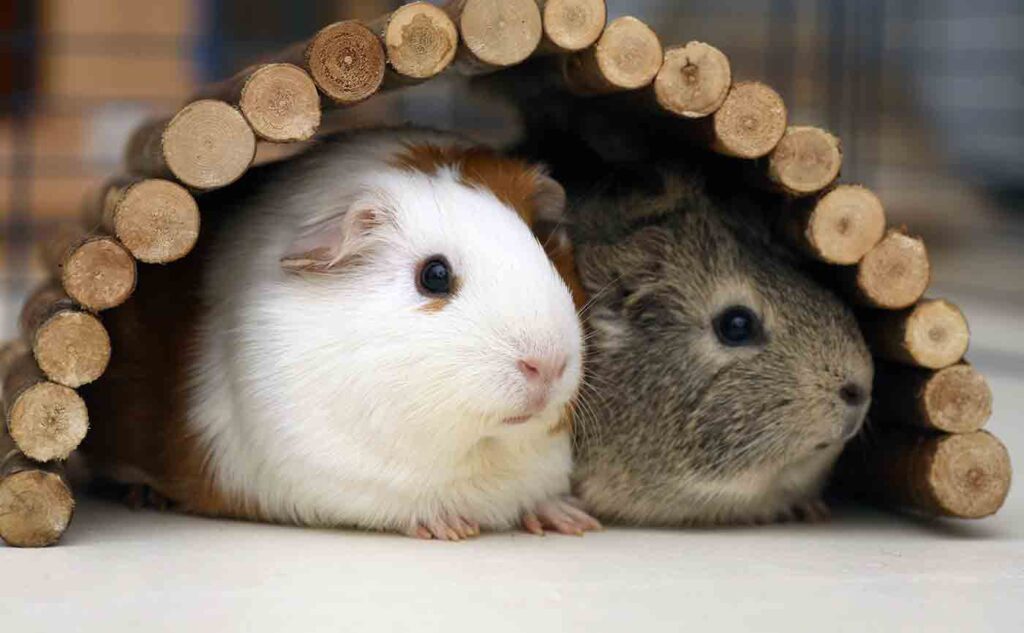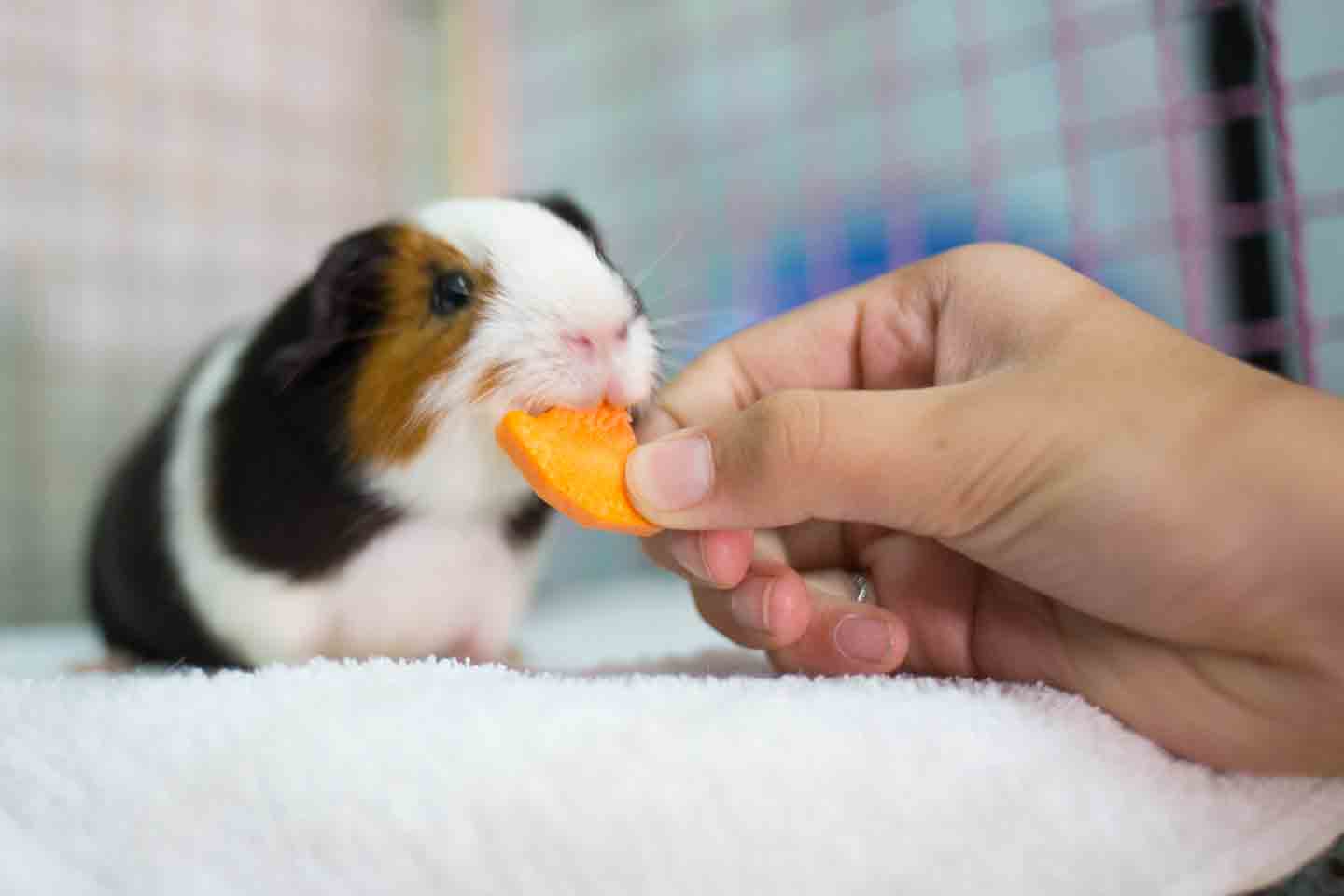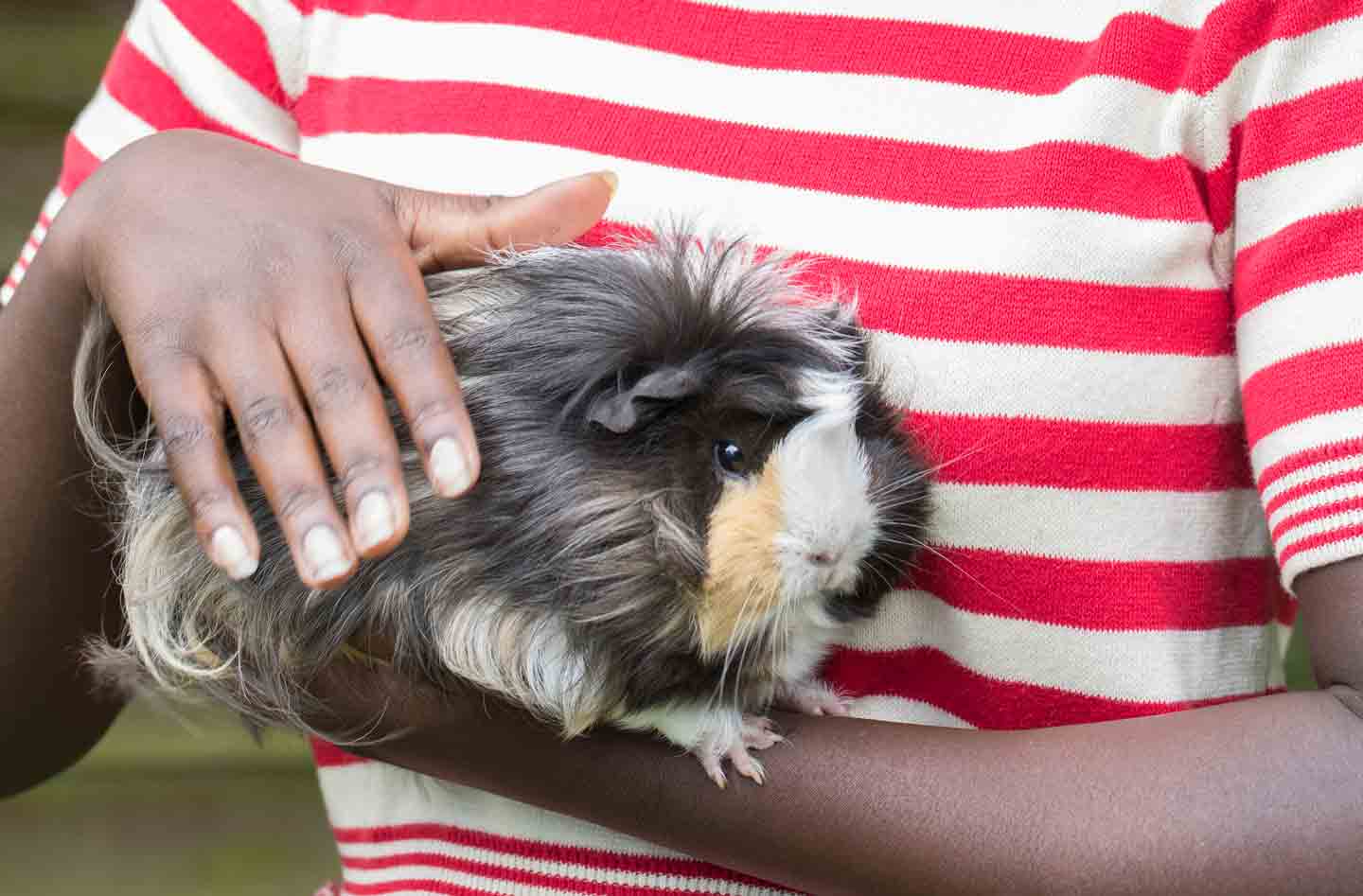Guinea Pigs Care Guide: How To Take Care of Guinea Pigs

Photo by kickers/Getty
Congratulations on your new guinea pig! These furry friends make wonderful pets—they’re sociable small animals suitable for any family, because they love to cuddle and bond with their humans.
So, how can you make sure your guinea pig is living their best life? This guinea pig care guide will walk you through everything you need to know.
Guinea Pigs: The Basics
Guinea pigs originally come from South America and are also referred to as “cavies.” (The term “cavy” is derived from their scientific name, Cavia porcellus.)
Guinea pigs are characterized by their round body and short “nub” tail. Their head is large and features soft, velvet-like ears. Guinea pigs typically have coarse hair and come in a wide variety of colors and patterns.
The American Cavy Breeder Association officially recognizes 13 distinct breeds, but the three types that are most popular among pet parents include:
- American: short, smooth hair
- Abyssinian: whorls of unruly, rough hair
- Peruvian: long-haired, silky
As social animals, guinea pigs thrive in herds, and it is recommended to adopt guinea pigs in groups of two or more of the same sex.
Guinea pigs make adorable wheeking noises to communicate over long distances and will even start squealing when they hear their pet parents open the refrigerator in anticipation of a vegetable or fruit treat! They also purr or coo when they are happy, often when cuddling with other guinea pigs or being pet by their humans.
Each guinea pig will have their own personality, much like dogs and cats.

Arisara_Tongdonnoi/Getty
Guinea Pig Supplies: What Do Guinea Pigs Need?
Your new guinea pig will need the following to lead a happy and healthy life:
- A large, secure enclosure or hutch
- High-quality pelleted guinea pig food
- Timothy or other grass hay
- Vitamin C supplement, such as Oxbow® Natural Science supplement
- Treats
- Bedding
- Food bowl and water bottle
- Hideaway place
- Toys
- Wood and mineral chews
- Small animal nail clippers, like the Kaytee® Pro-Nail Trimmer
- Cardboard tubes or boxes
The Best Food for Guinea Pigs
Piggies primarily eat hay, which makes up about 75% of the guinea pig diet. Timothy hay, orchard grass, and other grass hays are all great options and should always be available to guinea pigs. Do not, however, feed your guinea pig alfalfa hay, as it can lead to health complications.
Recommended Products
Guinea pig pellets can supplement their diet of hay. Offer 1–2 tablespoons per cavy per day and be sure to use pellets specifically formulated for guinea pigs.
Guinea pigs also love to eat fruits and vegetables! Leafy greens are a favorite option. New food items should be introduced slowly so your guinea pig’s digestive system can adjust. Vegetables should be a daily staple, including a rotation of:
- Romaine lettuce
- Leaf lettuce
- Carrots
- Tomatoes
- Clover
- Dandelion greens
- Cilantro
- Parsley
You can offer each guinea pig ½–1 cup of vegetables daily.
Fruits should be given sparingly (once or twice a week) as a treat—no more than that, or they may cause digestive issues for your pig. Some fruit options include:
- Apples
- Berries
- Cantaloupe
- Pineapple
- Kiwifruit
Vitamin C Supplements
Guinea pigs need vitamin C supplementation in their diet to stay healthy, as their body cannot synthesize the nutrient on its own. Vitamin C is important for skin health, as it helps with the formation of collagen.
Guinea pigs who do not receive enough nutritional vitamin C in their diet may show signs such as lethargy, poor hair coat, and slow wound healing. Severe vitamin C deficiency can lead to diarrhea, weight loss, respiratory failure, and even death.
Vitamin C supplements can be added to your guinea pig’s diet through drops added to their fresh water source, as well as treats featuring high concentrations of the nutrient, like Oxbow Natural Science Vitamin C Supplement.
The Best Housing for Guinea Pigs
An appropriately sized enclosure for a pet guinea pig is 36 inches long by 30 inches wide by 18 inches high, but bigger is always better.
Guinea pigs need space to run around, an eating area to munch on hay and other foods, as well as space for hideaway boxes, chews, and toys.
If housing more than one guinea pig, the cage size should increase by 20% per piggy.
Cages should feature a solid base enclosed with wire mesh bars spaced 1 inch apart.
Recommended Products
Any small pet enclosure should provide adequate ventilation, as many “pocket pets” have a sensitive respiratory system. Ammonia buildup from poor ventilation or inadequate cleaning can cause respiratory infections, which can be deadly.
Be sure to spot-clean your guinea pig’s cage daily, and use a recycled-paper bedding such as Carefresh® or Fresh News®. Do not use cedar shavings or any kind of dusty material for bedding, as these materials can irritate a guinea pig’s respiratory tract.
Guinea pigs may be fed with food bowls either hanging from the sides of the cage or in a ceramic bowl heavy enough that the animal can’t tip it over. Water can be offered in sipper bottles hung from the side of the cage or in a ceramic bowl like their food. Fresh food and water should be provided daily.
The best place for a guinea pig enclosure is in a quiet area of the home, away from any windows or doors. As prey animals, guinea pigs are sensitive to sounds and smells. It is not recommended to keep guinea pigs in bedrooms, as they are nocturnal animals and can keep you awake!
The Best Toys for Guinea Pigs
Guinea pigs require a variety of enrichment in their enclosure, as they can get bored easily. There are plenty of commercial guinea pig toy products as well as DIY options to provide your guinea pig the mental stimulation they need on a daily basis.
Guinea pigs need plenty of chew toys, as their teeth grow continuously throughout their life. Be sure to rotate and clean any wooden chew toys regularly, as they may become soiled with urine or accumulate dirt. Other toys for guinea pigs include brain teasers like treat balls or forage mats.
Recommended Products
Common Guinea Pig Health Issues
Guinea pigs may experience any of the following health issues during their lifetime:
- Lice or mites
- Ear infections
- Sneezing
- Pink eye
- Ringworm
- Heatstroke
- Pneumonia
- Vitamin C deficiency (scurvy)
- Dental issues
- Bacterial enteritis (i.e. Salmonella toxicity)
- Bumblefoot (pododermatitis, or inflammation and infection of the feet)
An adult guinea pig should receive a veterinary care checkup at least once per year. Your veterinarian will check your guinea pig’s teeth during the exam and can also help you with nail trimming, if necessary.
Always consult your veterinarian if your guinea pig shows signs of illness, such as:
- Noisy or labored breathing
- Lethargy
- Excessive itching
- Loose stool
- Discolored urine
- New lump or tumor development

Daisy-Daisy/Getty
How To Handle Guinea Pigs
Guinea pigs are typically easy to handle and will even come to their humans for cuddles when properly socialized. To pick up a guinea pig, use two hands: one to cup their front half and one to support their bottom. Guinea pigs generally enjoy being held and petted and may even purr like a cat when feeling content and cozy with their pet parent.
Always supervise children handling pet guinea pigs and teach them how to approach a small animal. Guinea pigs may try to run away or jump if they are startled or nervous. In the case of a fall, guinea pigs are most likely to land headfirst due to their body conformation. Be sure to inspect a guinea pig who has fallen for any injuries, especially broken teeth, and contact your veterinarian right away.
Guinea Pig FAQs
What’s the average lifespan of guinea pigs?
The average guinea pig lives five to seven years.
Do guinea pigs need shots?
Guinea pigs do not require vaccines; however, it is advised to bring your guinea pig to the veterinarian for a checkup once per year.
What do guinea pigs eat?
Guinea pigs primarily eat grass hay, pelleted food made for guinea pigs and veggies—and can be fed fruits as an occasional treat. Guinea pigs also require vitamin C supplements.
Do guinea pigs hibernate?
No, guinea pigs do not hibernate.
Are guinea pigs good pets?
Guinea pigs are great pets for any family, including first-time pet parents and children who understand calm and gentle handling.
Do guinea pigs bite?
Guinea pigs are typically not aggressive but may nibble or bite when they feel frightened or threatened.
Caring for a guinea pig is a rewarding experience that requires attention to their needs, from a spacious enclosure to a balanced diet and regular interaction. By following the tips in this guide, you’ll ensure your guinea pig stays happy, healthy, and well-loved.
This content was medically reviewed by Chewy vets.









